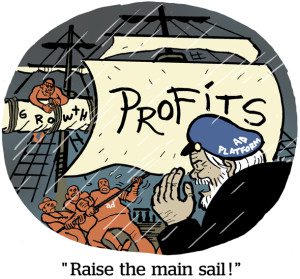The main theme one can draw from ad tech M&A activity in 2023 is that there wasn’t one.
Despite a few deals scattered throughout the year and a small flurry in Q4 – including Omnicom’s monster $835 million acquisition of Flywheel Digital and Perion’s far smaller but still notable $100 million purchase of out-of-home DSP Hivestack – overall deal activity in the ad tech market was down 10% year over year in 2023.
In fact, last year was “the worst in over a decade for deal volume,” said Conor McKenna, a partner at LUMA, which recently released its full-year 2023 market report.
Chin up
It’s no surprise deal volume was in a slump.
Interest rates were high, the economy felt questionable and the aroma of third-party-cookie-scented uncertainty permeated the ecosystem. As a result, even ad tech companies that were in the mood to merge often couldn’t align on price, McKenna said.
But there’s reason for cautious optimism in 2024, he said, both from a macro perspective and an industry point of view.
Confidence is growing that the Fed can deliver a soft landing for the US economy, and Google is finally getting on with its phaseout of third-party cookies in Chrome.
“We’ve all known data deprecation was coming, even if the timing has been iffy,” McKenna said. “But with the 1% rollout, Google does seem committed, and now that companies can really start to assess the impact, it’s going to be a consequential year.”
And hey, there’s some proof to point to already.
Just last week, LiveRamp bought data clean room provider Habu for $200 million.
Grain of salt
Still, it’s hard to believe an investment banker who tells you to expect an uptick in M&A momentum without being skeptical.
At the start of 2023, LUMA predicted that a rationalization in ad tech valuations would spur more deal-making throughout the year, and that did not come to pass. Far from it.
McKenna acknowledges the point.
“It’s no shock that an M&A banker is gonna say they think we’re heading for more M&A, but there really is less uncertainty now,” he said. “If Google had started to make its cookie changes back in 2022 or 2023, we would’ve seen more ad tech M&A back then.”
Done deals
Which is not to say ad tech M&A ground to a complete halt last year. There were several rather interesting deals in the mix.
In addition to the Omnicom/Flywheel merger, which is evidence of how hopeful agencies and holding companies are about commerce media, McKenna pointed to DoubleVerify’s acquisition of AI startup Scibids in July (and not just because LUMA was a financial advisor on that deal).
Through a mix of predictive and generative AI, Scibids analyzes the signals generated by a DSP, which advertisers can use to automate and optimize programmatic bids across buying platforms.
The DoubleVerify/Scibids deal is a good example of how companies can use AI to make decisions based on less data in light of ongoing signal loss, McKenna said.
“This is a company making a concerted bet on where the future of this industry is heading,” he said, “and really leaning on M&A with confidence to go into that space.”
Bear in mind
Still, not everyone takes such a rosy view of ad tech’s prospects.
According to independent equity research firm Arete Research, the ad tech market is long overdue for a correction.
At an AdExchanger event early last year, Richard Kramer, Arete’s founder, said M&A won’t save the ad tech market “because deals almost always destroy value, unlike what the investment bank advisors say.”
But McKenna sees signs of resilience.
Over the past decade, ad tech has gone through multiple boom-and-bust cycles. It’s been in favor among investors, fallen out of favor and come back into favor again. And it’s still here.
“There are always pockets in this ecosystem to be bearish on, because things move fast and change pretty quickly – but ad spend continues to go up consistently and digital continues to grow,” McKenna. “This really is a vibrant market.”















